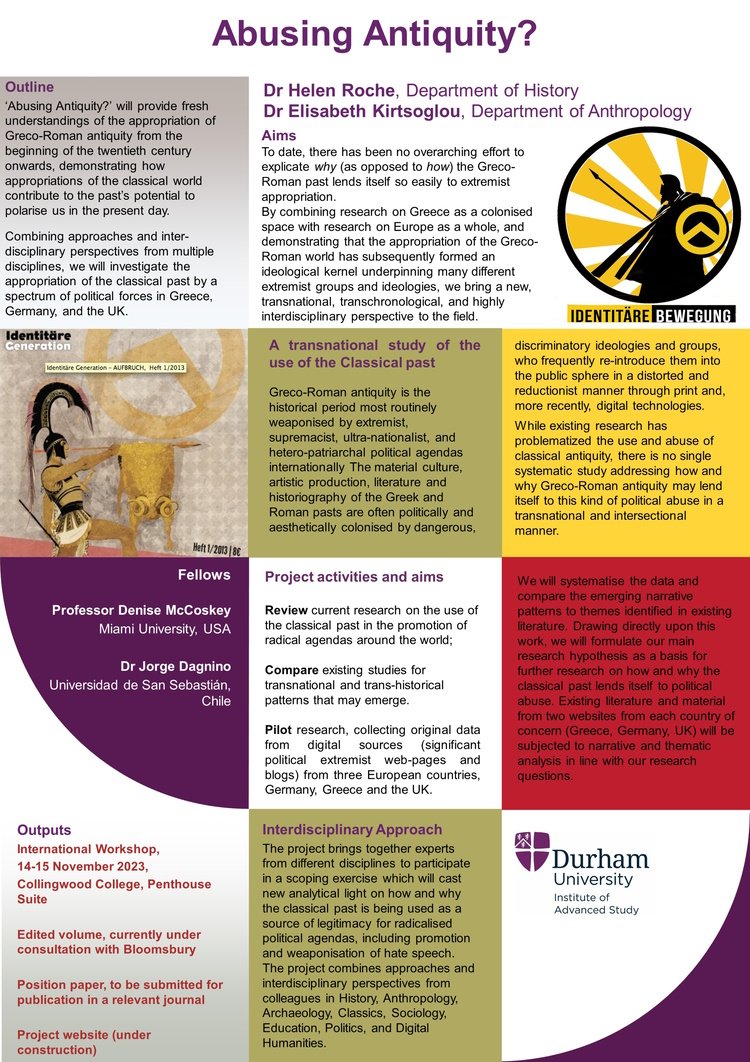Research
Despite the global importance of the gaming industry, and the centrality of video-games and contemporary boardgames as cultural artefacts in the modern world, historians beyond the sub-discipline of Historical Game Studies have often failed to consider games seriously as historical sources, while game-industry professionals do not necessarily consider explicit historical methodologies when designing games set in the past.Read more...
 IAS Major Project: 'Abusing Antiquity? Classics and the Contemporary Far Right'
IAS Major Project: 'Abusing Antiquity? Classics and the Contemporary Far Right'The rise in visibility of the global far right over the last ten years has led to many scholarly discussions of how extremist narratives are formulated and circulated.
This project aimed to interrogate one particular strand within such right-wing narratives: the use of ancient Greece and Rome – a topic which has not yet received comprehensive investigation. In taking on this important and deeply unsettling form of classical reception, we also sought to examine how disciplinary structures have themselves been complicit in producing and reproducing politicised narratives about the ancient world.Read more...
Helen's third monograph, The Allure of Fascism: Why Interwar Europe Thought that Fascism was the Future, 1919-1939, is a trade monograph aimed at the general public. The book will explore diaries and other egodocuments from Fascist Italy and Nazi Germany, seeking to understand why ordinary people were attracted to fascism as an ideology, a political system, and a way of life.Read more...
 Second Book Project: The Third Reich's Elite Schools – A History of the Napolas
Second Book Project: The Third Reich's Elite Schools – A History of the NapolasThe Nationalpolitische Erziehungsanstalten (National-Political Education Institutes), known as Napolas for short, were the most prominent type of elite school in Nazi Germany. Founded in 1933 as a birthday present for Hitler, these boarding-schools, which educated pupils from the age of 10 upwards, were intended to train the future elite of the Third Reich in all walks of life.
A monograph based on this research project, entitled The Third Reich's Elite Schools: A History of the Napolas, has now been published by Oxford University Press.Read more...
 PhD Research Project: Personal and Political Appropriations of Sparta in German Elite Education during the 19th and 20th Centuries
PhD Research Project: Personal and Political Appropriations of Sparta in German Elite Education during the 19th and 20th CenturiesAncient Sparta was particularly prized as a paradigm for Prusso-German military elite-education during the 19th and 20th centuries. Analysis of two case-studies, the Royal Prussian Cadet-Corps and the Napolas, has demonstrated that generations of future German officers and putative Nazi leaders were trained to see a 'Spartan' way of life as their ultimate aspiration.
A monograph based on this research project, entitled Sparta's German Children. The ideal of ancient Sparta in the Royal Prussian Cadet-Corps, 1818-1920, and in National Socialist elite schools (the Napolas), 1933-1945, was published in 2013 by the Classical Press of Wales.Read more...
